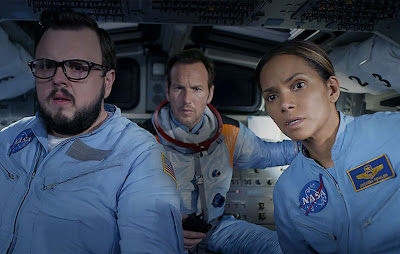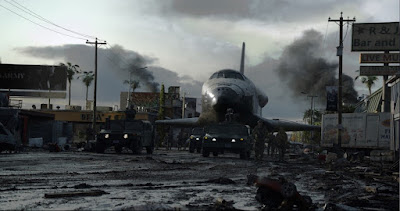As the expository title suggests, the moon has improbably left its orbit and is falling from the sky, about to make a direct hit on – what else? – Earth, shifting the tides, causing the blue marble to pitch at strangle angles like the deck of the Titanic. Janitor cum conspiracy theorist K.C. Houseman (John Bradley) is convinced the moon is no moon but an alien-built superstructure, an absurd-sounding idea that cuts closer to the truth when the mission NASA enlists to prevent the celestial body from falling makes an unlikely discovery. “Everything we thought we knew about the nature of the universe has just gone out the window,” says Jocinda Fowler (Halle Berry), NASA’s Deputy Director who is promptly promoted to actual Director when the acting one hands over his badge and says goodbye and good luck. This moment is funnier anything in “Don’t Look Up”, comically evincing the State as throwing up its hands in the face of looming global catastrophe, not unevocative of the 45th President telling Governors to get ventilators and respirators themselves. That the Pentagon eventually settles on a nuclear option is treated with hilarious understatement, like they literally can’t think of anything else. Uh, I don’t know; nuke it!
Jocinda also enlists the help of Brian Harper (Patrick Wilson), a disgraced former astronaut with the requisite family problems – his divorced wife (Carolina Bartczak), his estranged son (Charlie Plummer), his divorced wife’s Lexus dealer husband (Michael Peña) – and whose moonshot will become a shot at redemption. He, Jocinda, and K.C. form our ragtag world-saving trio by flying the Space Shuttle Endeavour to the moon to sort out this apocalyptic mess while the respective families of Brian and Jocinda try to reach a Colorado military base before the falling moon makes impact. If the shuttle mission would undoubtedly require all manner of technicians and on-the-ground help, Emmerich concerns him less with such specifics than the punk aesthetic of the mission in the first place, underlined not just in the Fuck the Moon graffitied onto Endeavour’s side but in the DIY aspect of hauling Endeavour out of the Endeavour Museum in Exposition Park and through the streets of L.A. Emmerich dramatizes the launch with a tidal wave born of the planet tilting out of whack bearing down on the shuttle in the moments just before though the conspicuously junky effects in scenes like this one really call into question where the $140 million budget went. And while top-line effects are not necessary to make a scene like this work, it also needs to be fun, and the execution here fails to match the concept’s supersized merriment.
That lack of fun trickles down to the acting. Bradley is having a little, to his credit, playing an overeager dork who, despite his conspiracy theories, is more in awe of NASA than suspicious of it. Berry is noteworthy at just how effortlessly she renders ridiculously expository lines believable. Then again, this is not exactly fun. Wilson, meanwhile, is just not up to the task. He never feels like the irresponsible motorcycle riding rebel of the early scenes nor the suddenly enlightened madman of the later scenes. And crucially, the supporting cast, from Plummer to Peña to Eme Ikwuakor as Jocinda’s ex fail to add any flourish whatsoever. What made the first “Sharknado” a cheesy cult favorite, even if people did not consciously recognize it, was that supporting actors like Cassie Scerbo and Christopher Wolfe were really reaching for the stars, in their way. No one in “Moonfall” is reaching for the stars, not even Donald Sutherland whose riff on his famous X character of “JFK” is just a weak cover.
At least Emmerich retains a gift for zany plot details. A cat urine-stained newspaper leads K.C. to Brian to pitch his wild theories while Brian’s estranged son being arrested in an L.A. freeway chase is not merely an embodiment of how he’s rebelled in the wake of his father and mother’s divorce but set-up for a later crazy car chase on the way to Colorado as he and his small, diverse crew (Emmerich again, who might have a soft spot for libertarian ethos but nevertheless remains a firm believer in the Rainbow Coalition) are forced to evade some thieves. Still, if this sequence would seem the perfect moment to drop the needle on the same song employed in the trailer – CCR’s “Bad Moon Rising” – given how the moon is literally rising before them, it never happens. And while that might be the reviewer wanting to rewrite the movie, I mean it more as a suggestion of how the movie never fully lets itself go loony tunes despite its third act narrative blowout, Brian and Jocinda’s conflict too ho-hum, Brian’s redemption too pat, the dynamics of their respective families strangely solemn rather than cheerfully corny, a party with a good party theme but not enough chips and dip.





No comments:
Post a Comment